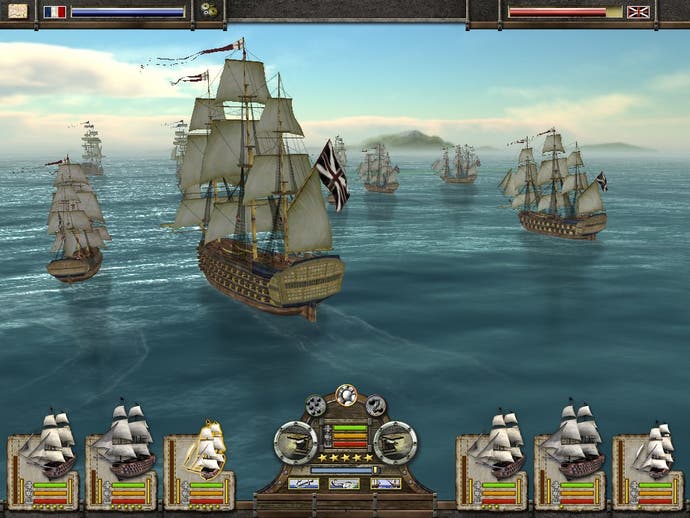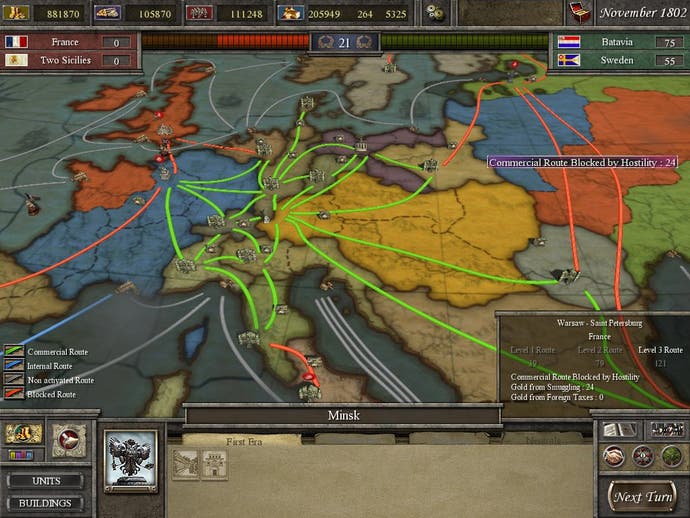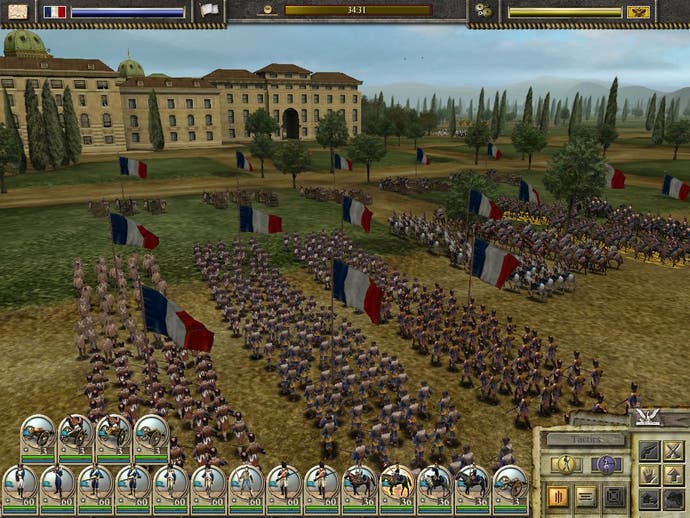Imperial Glory
Metric Dishonour.
It doesn't take much to pass from courting disaster to marrying her. Such is the case with Imperial Glory, which does a lot of things right and a handful of things wrong and ends up being disqualified from our affections by a few own goals. But at least it doesn't mix its metaphors.
The high concept is simple: It's Creative Assembly's Total War series, but applied to the Napoleonic era. This means that while there are historical battles, multiplayer and skirmishes, the core of the game is an elaborate campaign mode. This places you in charge of one of five period empires. Mostly it's a Risk-style strategy map of Europe where you manage your affairs, construct armies, conquer provinces and perform research. When a battle actually takes place, you're given the option of fighting the battle in exciting 3D-RTS-o-Vision.
In terms of strong points, on the strategy map the most memorable is Diplomacy. Unlike than the rather meaningless deals you may see in many other games, mutual defence treaties actually count for something here. They last for a set amount of time, and if one party is attacked then all parties must change their status to hostile. There are many other options, including marrying heirs, financial deals and simply trying to improve your reputation with their people. The last is interesting, in that your actions shape other countries long-term opinion of you. For example, attack without formally declaring war and you'll justifiably be considered something of a bounder by the rest of Europe.
That aside, it does lack some of Total War's character. For example, generals are little more than a flag to attach your units to allow them to move around the map. While they gain experience, it's at a rate where you don't particularly mind if one dies. On the more practical side, some of the game's options are a little confusedly expressed in-engine. Why can't you construct merchant ships on the standard construction menu? I don't know. Go ask the designer.

When you fight a battle, you discover that each area has a different map and specific objective. As well as the expected "Kill Everyone", there are other mission types. For example, there could be three objectives, with holding two for a period enough to secure victory. In practice, most games end by annihilation, with the objectives more about avoiding stalemate than something you actually achieve. If there wasn't a reason why you had to advance on a unit taking cover in a house (using buildings as firing positions is one of Imperial Glory's better tactical-level features), you'd never do it. In terms of your opponent, he's a decent enough fellow for a computer simulation of a gentleman. While not entirely flawless, major errors of judgement are rare enough to be forgivable. Altering its tactics depending upon your army's consistent elements is one of its stronger points.
However, in terms of play, it's a disjointed and ill-paced game. On the strategy map, due to tight economic restrictions, there's relatively little you can do in a single turn, except fiddle and press "next turn". The simple delay, as it moves through the game's many NPC factions, slows the pace of the game to a crawl. More critically, on the actual tactical real-time maps, there's a similar lop-sided nature.

You see, the game appears to feature none of the staples of large-scale battle games, with you unable to either speed up time when nothing is happening or pause to issue orders when things get too hectic. This really is somewhat bizarre, with most campaign games featuring a few minutes of trudging to reach the oppositions line, followed by a frenetic sixty or so seconds of clicking. What makes this worse is that while you have to order all your units individually, the computer, like some impossibly perfectionist conductor, can choreograph all theirs simultaneously. Watching the manoeuvres of your own forces is a terribly lumpen thing in comparison with the graceful dancing of the opposition. Much like fellow Napoleonic game Cossacks 2, it's at its worse when the battle is split across two areas, where the AI's omnipresence really gains an inhuman advantage.
When they're actually engaged, things rapidly fall into the standard problem of many RTS games. That is, the uncontrollable mob of funny little men that's impossible to untangle. Also rather than competitors Cossacks or Total War's morale system, something very basic is in place here. Occasionally, when troops take a lot of damage, they'll run away for a bit before recovering their wits. It's rather cursory, as most battles will end when one or the other side is slaughtered to death. Apart from this near-suicidal bravery, you also have to wonder how well the assorted knapsack-fife-drum-wielding troops have been drilled. If the enemies approach, they'll determinedly alter their own position to whatever they think best, breaking your planned tactics. In the favour of the sergeant majors, if one of your troops finds themselves in front of one of their own cannon batteries they'll happily accept hot ball after hot ball ploughing through their ranks, meekly reshuffling to fill in their felled comrade's place.

Essentially, while both sides of the game have their charms, it very much feels like a slightly awkward hybrid rather than the more integrated Total War. The RTS side, rather than playing out as anything really resembling the period battles, plays out like... well, an RTS game. Equally, while there are strong points on the strategic side as a game, it seems a little forced in how it turns the period into a strategy game. Things like - to choose an example - Britain starting with a military fleet, but no military docks are very much the result of a designer deciding that they need a suitably long development tree for the player to research but realising that the actual technology of the period doesn't actually allow it. So they shrug, pretend that basic advances weren't previously existent and start the empires in a regressed state to allow them room to grow. While Cossacks is an equally flawed game, it grasps the realism thistle more firmly than this.
Not that a lack of realism is a fatal crime, even in a historical game. Its biggest mistakes are the previously mentioned easily avoidable ones which you can't quite believe such an experienced developer made. If the game features periods where you sit and wait, adding a speed-up option doesn't exactly require divine inspiration. If the game stresses strategy rather than an action and the decisions are compressed into a small area of time, a pause to give order function would seem as terribly obvious. Except clearly not.
There's really something fundamentally wrong in a game where I start keeping a book beside the table to read while my armies trudge into battle. That said, it's a good book and I recommend it.

